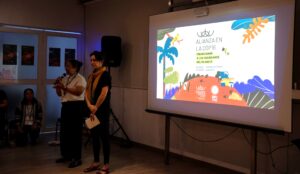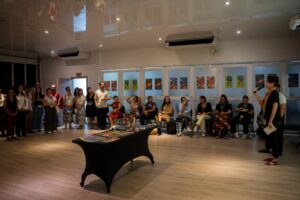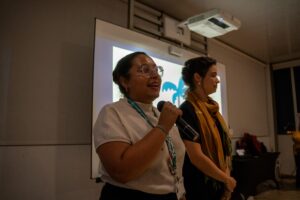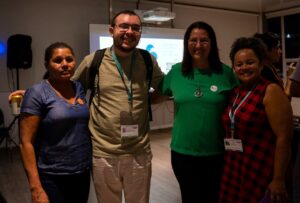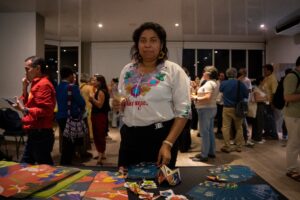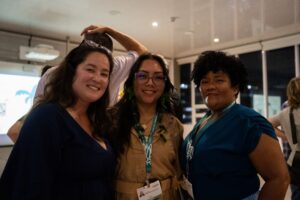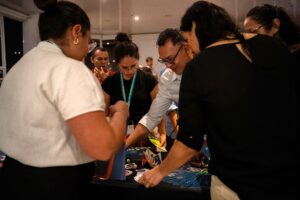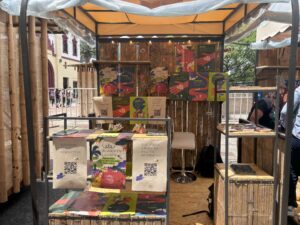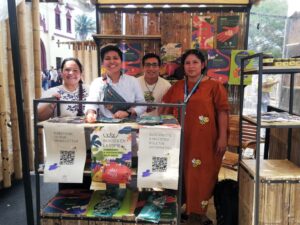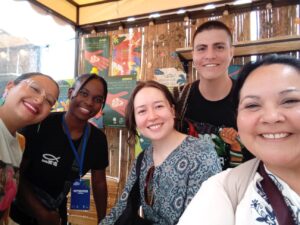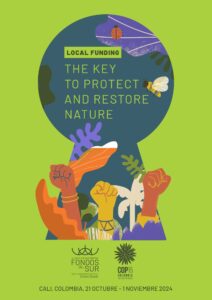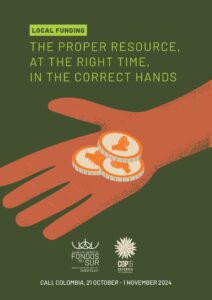In Cali, we united voices from the Global South to defend nature and social justice.
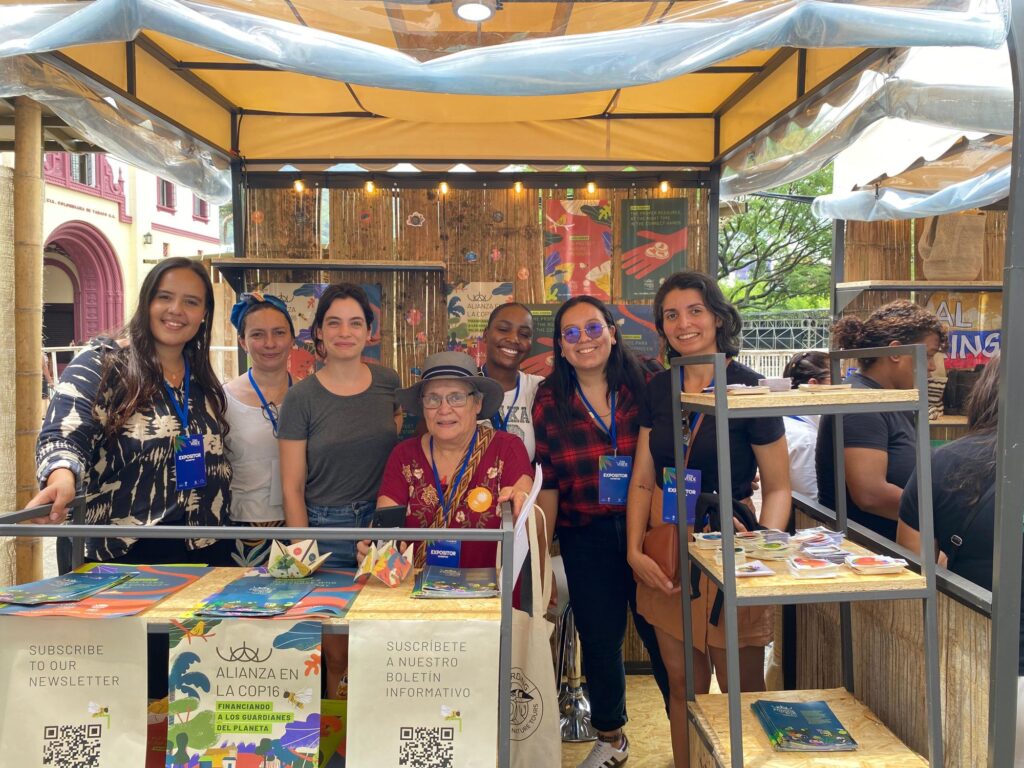
Executive Coordination and the team from Fondo Emerger, the Colombian member of Alianza, at our stand in the Green Zone.
The COP16 on Biodiversity, the 16th Conference of the Parties to the UN Convention on Biological Diversity (CBD), held this October in Colombia, gathered global leaders, organizations, and experts to accelerate the implementation of the Global Biodiversity Framework. This plan seeks to halt biodiversity loss, restore ecosystems, and promote the sustainable use of natural resources by 2030.
This year, the conference brought together voices worldwide in the vibrant setting of Cali, one of Colombia’s largest cities and among the most biodiverse countries, where potential and challenges coexist. It was a unique opportunity for the Socio-environmental Funds of the Global South | Alianza Fondos del Sur and its members to demonstrate the value of direct support for local communities, the true guardians of nature. In every panel, meeting, and dialogue, we carried a clear purpose: to ensure that funding solutions and conservation commitments are rooted in the realities of these protagonists.
Bridges and knowledge
Our participation spanned multiple events, always with the mission to highlight themes representing the future of biodiversity conservation funding.
In one of the most significant moments of COP16, we hosted the panel Funding the Planet’s Guardians in collaboration with Fundo Casa Socioambiental. The event at the Brazil Pavilion celebrated the strength of communities and the resilience of local funds. Experts shared their experiences, discussing how direct financial support can be adaptable, respecting the specificities of each biome and the local needs.
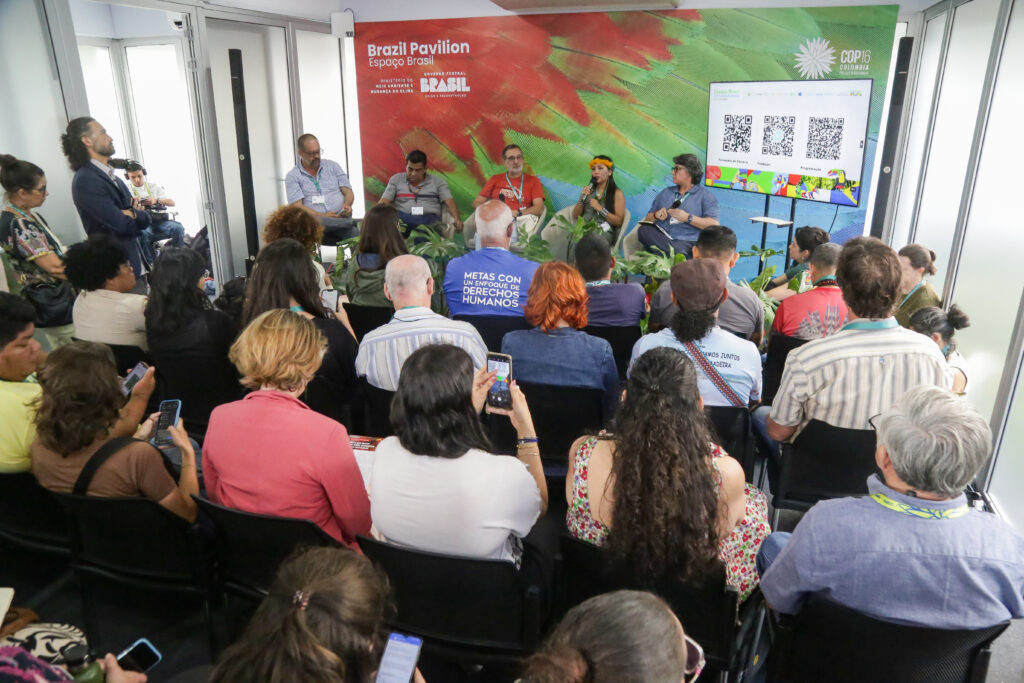
Stories of resilience and community strengthening
During the panel, we heard inspiring accounts from leaders on the front lines of this movement. Claudia Gibeli, from Casa Fund, emphasized the urgency of flexible resources that adapt to diverse contexts. She cited challenges in protecting essential biomes like the Brazilian Atlantic Forest, which often fall outside the pre-set strategies of major donors from the Global North. Gibeli shared Fundo Casa’s approach, which created a program dedicated to this biome with its resources, drawing attention to larger-scale funding and the high demand for support.
Fábio Vaz, representing Fundo Ecos, from the Instituto Sociedade, População e Natureza (ISPN), highlighted the trustworthiness of working with communities. With nearly a thousand initiatives supported over 30 years by Fundo Ecos, which operates the Small-Grants program of the Global Environment Facility (GEF), he noted that problems encountered were minimal, proving that investing in communities is highly effective. Vaz also noted that working with communities reaches beyond immediate project results, yielding profound social and structural impacts.
Representing the host country of COP16, Juan Camilo Mira from Fondo Emerger in Colombia partnered with the Ministry of Environment in an initiative that mobilized community leaders nationwide to attend the event in Cali. Thanks to the fund’s support, 150 leaders could attend the event. Camilo emphasized the ongoing challenges in channeling government resources to these actors, pointing out obstacles such as access to information and decision-making speed.
The two Indigenous leaders present at the discussion also highlighted adaptation to contextual and cultural challenges. Josimara Baré, from the Amazon Community Funds Network (Rede de Fundos Comunitários da Amazônia), emphasized the adaptability of territorial funds, which can receive and review projects in Indigenous languages, for example. She underscored the importance of inclusive processes that respect local cultures, showing that funding must be sensitive to the realities of these territories.
Levi Sucre, from the Global Alliance of Territorial Communities, introduced the Shandia mechanism, a collective platform designed to channel direct funding to Indigenous and traditional territories. Levi stressed the importance of cultural mediation to facilitate understanding between communities and funders, which involves mutual learning about the meaning of terms and practices.
Informal spaces
Beyond panels and roundtables, we hosted a networking Happy Hour that brought together partners and representatives from Alianza’s member funds present at COP16. In an informal setting, free of time limits or strict agendas, we exchanged practices, shared ideas, and deepened our perspectives, creating even more space for inspiring collaborations and genuine connections.
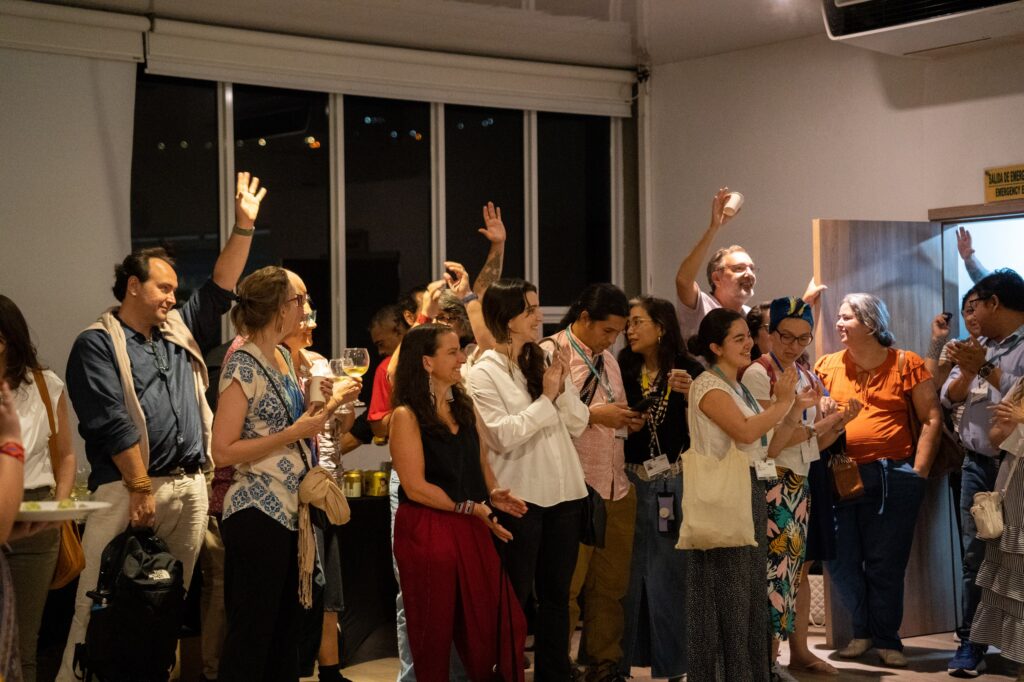
Alianza also had a stand in the Green Zone, a space designed by the Colombian government to allow the residents of Cali to engage with the issues discussed in the Blue Zone. Our stand served as a meeting point between our member funds and various community organizations, allowing for a rich and natural exchange amid a vibrant atmosphere.
In our Green Zone stand, the posters highlight how local funding drives solutions from within communities, emphasizing the importance of placing the power of local investment at the heart of biodiversity protection.
Reflections and paths ahead
We were present in Cali to advocate for a model of financial support that respects and values the leadership of local communities. By actively participating in COP16, we reinforced our commitment to amplifying these local voices and ensuring their needs are recognized in global decision-making spaces.
We had several opportunities to share experiences demonstrating the effectiveness of direct investment in community initiatives, highlighting how these actions are fundamental to biodiversity preservation. In this context, we want to celebrate and recognize the valuable presence of our member funds – Fondo Emerger (Colombia), Fundación Ñeque (Ecuador), Fondo Socioambiental del Perú, Fundación Socioambiental Semilla (Bolivia), Casa Socio-Environmental Fund, Fundo Ecos – Instituto Sociedade, População e Natureza (ISPN) (Brazil), Fondo Socioambiental Plurales (Argentina), and Pastor Rice Small Grants Fund – NTFP-EP Asia (Southeast Asia) – who participated so actively in the conference.
Through their contributions, they promoted important discussions, launched calls and initiatives, and celebrated significant project milestones while raising crucial issues for nature conservation and social justice. As we move forward, we envision a new chapter in the story of biodiversity, where the Global South’s voices are heard and nature and communities can thrive together.
Check out some photos of Alianza and our funds at the conference:

